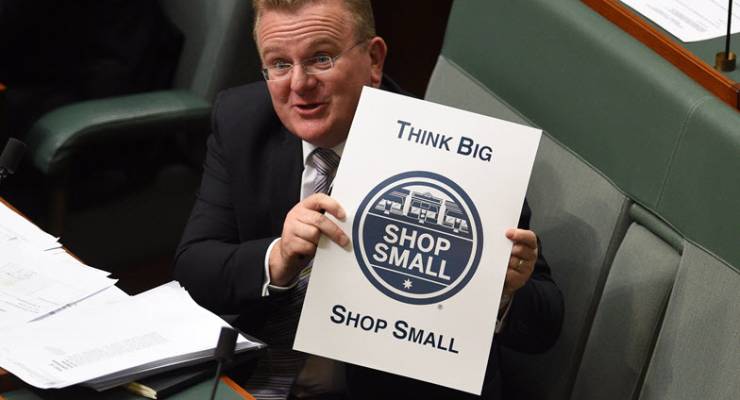
The head of the Department of Prime Minister and Cabinet, Martin Parkinson, was correct to decide that former MP Bruce Billson did nothing wrong in taking a position with the Franchise Council of Australia while still an MP, without disclosing his salary. There are so few hard and fast rules, let alone laws, around MPs’ conduct, and that of those with whom they interact, that even egregious behaviour is unlikely to earn any official sanction. And even if there were, there’s no independent body to administer the rules beyond the recently established Independent Parliamentary Expenses Authority that deals with expenses.
That body was established partly because any review of incidents of abuse of travel entitlements had to be conducted by a department controlled by the government itself, raising a serious question about any inquiries that cleared a government MP. Indeed, the Abbott government requested Jane “kids overboard” Halton to review Bronwyn Bishop’s serial rorting of her travel allowances, despite the fact that Halton had already declared that Bishop was simply the victim of a sexist double standard. Eventually it was the politics, not Halton, that brought Bishop down. The executive reviewing its own members is never a good look, as the eventual establishment of the IPEA by Malcolm Turnbull illustrates.
The problem is as much about the vagueness of the rules as about the lack of independence of the investigating body. The rules around political donations, which are so weak as to essentially make disclosure voluntary. That Bill Shorten and Victorian Labor were able to get away with making a $60,000 donation disclosure seven years late, that Tony Abbott’s fundraising body made one four years late, that disclosures and amendments two and three years later are routine, that voters are left in the dark for years about who is trying to influence politicians, reflects the worst set of political donation disclosure rules in the Western world.
The future of lobbying in Canberra
But it’s in lobbying that the lack of rules and an independent regulator is most problematic. Two big changes have turned lobbying into the most concerning area for misconduct and potential corruption. Lobbying is now a big industry in Canberra, with those areas of corporate Australia that don’t have their own in-house lobbyists willing to spend a lot of money trying to influence policy outcomes at both the political and public service level. That both sides of politics are now committed to playing a far more interventionist role in the economy augurs well for the future of lobbying in Canberra.
The second is the professionalisation of politics, which means more people enter politics with the expectation that they will have an entire career either working for MPs, as MPs, lobbying MPs or being appointed by MPs to public bodies, from student politics all the way through to the cushy retirement gig on a GBE board or — if you’re lucky — a diplomatic posting to a developed country.
You don’t even have to be an MP to play this sort of role. Bruce Hawker has combined lobbying and political advisory work for years, including a stint with Kevin Rudd Mark II. Former Queensland Labor secretary Cameron Milner was unable to secure a parliamentary career, became a lobbyist for over a decade, then became Bill Shorten’s chief of staff before taking on the cause of Adani for his Next Level Strategic Service lobbying outfit — except he has also been helping prepare Annastacia Palaszczuk’s coming election campaign. Milner has now announced he’s ended his lobbying for Adani. But as the examples of Martin Ferguson, Ian Macfarlane and Billson demonstrate, it’s former politicians walking straight into corporate gigs that rankles the most — especially when its in an industry with which politicians dealt as ministers, in blatant evasion of the ministerial code of conduct.
There is very little corruption in federal politics. And people have a right to use their skills and CV as effectively as possible if they’re no longer in politics, which is an inherently fragile occupation even if you have a safe seat. But our current lack of rules and oversight would do nothing to stop the corrupt should they arise. And it creates a general air of incipient sleaze over the whole of politics.
Jacqui Lambie, impressively, has put together an interesting regulatory framework that would impose an industry-wide code of practice, including a much longer cooling-off period. It may not be ideal, but what passes for the current framework is barely good enough for a more innocent pre-professionalisation era.








Crikey is committed to hosting lively discussions. Help us keep the conversation useful, interesting and welcoming. We aim to publish comments quickly in the interest of promoting robust conversation, but we’re a small team and we deploy filters to protect against legal risk. Occasionally your comment may be held up while we review, but we’re working as fast as we can to keep the conversation rolling.
The Crikey comment section is members-only content. Please subscribe to leave a comment.
The Crikey comment section is members-only content. Please login to leave a comment.